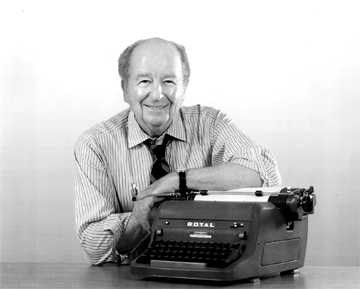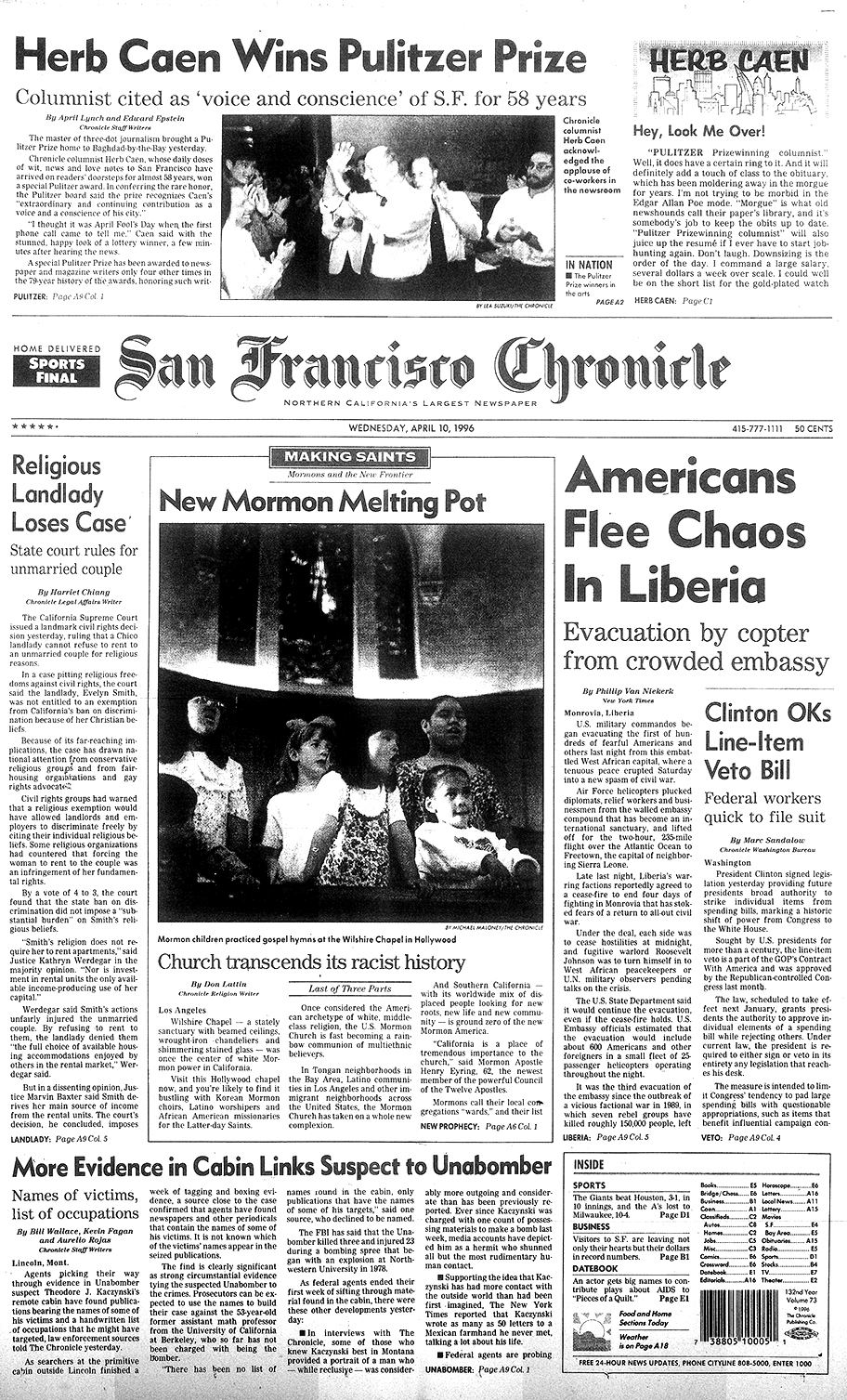
Herb Caen Wins Pulitzer Prize
By April Lynch and Edward Epstein
San Francisco Chronicle Staff Writers
The master of three-dot journalism brought a Pulitzer Prize home to Baghdad-by-the-Bay yesterday.
Chronicle columnist Herb Caen, whose daily doses of wit, news and love notes to San Francisco have arrived on readers’ doorsteps for almost 58 years, won a special Pulitzer award. In conferring the rare honor, the Pulitzer board said the prize recognizes Caen’s extraordinary and continuing contribution as a voice and conscience of his city.”
“I thought it was April Fool’s Day when the first phone call came to tell me,” Caen said with the stunned, happy look of a lottery winner, a few minutes after hearing the news.
A special Pulitzer Prize has been awarded to newspaper and magazine writers only four other times in the 79-year history of the awards, honoring such writers as Walter Lippmann and E.B. White. Caen’s award was The Chronicle’s Fifth Pulitzer.
Another California newspaper was also awarded one of this year’s coveted prizes. The staff of The Orange County Register won in the category of investigative reporting for stories that uncovered fraud at the UC-Irvine fertility clinic.
Champagne flowed in the Register and Chronicle newsrooms after the prizes were announced. At an impromptu party for Caen, Chronicle Editor Bill German led the staff in a toast and a long round of cheers and applause.
“The Pulitzer people got it right,” said German. “Here’s to Herb Caen – it’s well-deserved.”
“I could quit now, except for the word ‘continuing’ in the Pulitzer announcement,” Caen told the newsroom crowd. “I’m not sure what to do next. Maybe I can win the Nobel.”
Caen began his column in 1938 at the age of 22. His daily 1,000-word report weaves together celebrity sightings, news scoops, tales from the city’s watering holes, society gossip, and the occasional jab at the high and mighty. Caen has backed political candidates he believes in, chided the city when it has fallen short and penned paeans to San Francisco that ring more as romantic sonnets than mere tales of place.
His serious side has seen him at the forefront of great causes, locally and nationally.
He has long opposed the death penalty and was one of the first voices in the mainstream press to question the Vietnam War.
Caen’s positions have not always carried the day. For instance, his opposition to capital punishment has remained consistent, even as Californians in general have moved increasingly to support the death penalty.
“People don’t often think of him as an advocate of justice,” said Dorothy Ehrlich, executive director of the American Civil Liberties Union of Northern California. “He has taken a courageous position, and he must know that this is not a popular position.”
 His long-running career has also made him a fixture of public life. Senator Dianne Feinstein will never forget the moment she first set eyes on him.
His long-running career has also made him a fixture of public life. Senator Dianne Feinstein will never forget the moment she first set eyes on him.
“My first glimpse of Herb Caen was before I could even read street signs,” Feinstein said yesterday. “I was guess I was 6 years old, and I was riding downtown alone on the bus to go to the dentist.
“I saw a man in a camel-hair coat strolling down the street with a blonde on both arms. It was Herb Caen,” said the woman who became a frequent subject of Caen items during her long years in politics, especially as mayor.
Though Caen often looks to the city’s past for inspiration, he has a loving feel for San Francisco’s present and future. A staunch union man who spoke eloquently for fellow journalists during two newspaper strikes, he can also hold his own among the city’s rich and powerful. Many simply call his columns a San Francisco institution.
“He has more influence on his city than any columnist in any American city I can think of, now or in the past,” said Tom Goldstein, dean of the Graduate School of Journalism at the University of California at Berkeley.
“He is an exemplar to our accursed trade,” said Martin Nolan, former editorial page editor of The Boston Globe and now the paper’s West Coast correspondent. “His work ethic and his way of making his column look so easy are unsurpassed. His column is really cliché-free, after all these millions of words.”
Other readers credit Caen with holding the city together during the Vietnam War, the Peoples Temple tragedy and the assassination of former Mayor George Moscone and former Supervisor Harvey Milk. On Caen’s 80th birthday last week, an Oakland Tribune editorial said he should have been awarded a Pulitzer long ago for the columns he wrote during those dark days.
Caen said that while many people say his moody ruminations are his best, he feels a bit ill at ease with that style of writing. “I’m out of character when I write those pieces,” he said. “I’m most proud of the dailies, the ones that don’t turn out too bad. If it has a good joke, I’m happy.”
The Pulitzers honor the best of newspapering, but writing with a touch of pop humor rarely makes it onto the Pulitzer honor roll. More than seven years ago, a platoon of distinguished writers and journalists, including everyone from legendary New York columnist Jimmy Breslin to television sophisticate Alistair Cooke, began urging the Pulitzer board to reward Caen’s work.
“His enthusiasm over 50 years is unparalleled in a business known for burned-out cases at age 40,” said one backer R.W. Apple Jr., Washington bureau chief of the New York Times and a Caen friend since 1968. “His city has shaped him, and he has helped shape his city.”
Said German: “This has been a long time coming. After all those years of knocking on the door, this feels great.”
The prizes, the most prestigious awards given for journalism, are presented annually by Columbia University. Prizes include a cash award of $3,000, except for the public service award, which is a gold medal.
